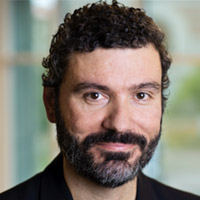TiGRE Webinars
Trust & Regulatory Governance in an Age of Crisis
November 2020 — March 2021
Presentations index
Seminar Goals
Issues of trust and regulation stand at the centre of social science analysis in the last decades. They are becoming even more important nowadays with the Covid-19 crisis. Our aim in this series of seminar talks is to present the basic scholarly concepts and ideas around the topic; to promote an advanced analysis and to discuss the issues on the agenda from a theoretical, historical and comparative perspective.
Series Editors
Tobias BachUniversity of Oslo Jacint JordanaIBEI and University of Pompu Fabra Stephan GrimmelikhuijsenUtrecht University David Levi-FaurJerusalem Forum on Regulation and Governance; Hebrew University of Jerusalem Martino Maggetti University of Lausanne Ioannis PapadopoulosUniversity of Lausanne Heidi Houlberg SalomonsenAarhus University Rahel ShomakerSpeyer University Koen VerhoestUniversity of Antwerpen - GOVTRUST
Trust and distrust in transformations
Professor Dominika Latusek-Jurczak

Wednesday, March 10, 2021
06:00 PST
09:00 EST
14:00 GMT
15:00 CET
16:00 Jerusalem
Edoardo Guaschino
Is trust always necessary for effective functioning of complex systems such as organizations or societies? If communities are pervaded with distrust, how can they start reverting the vicious cycles and build trust, or – at least – stop escalating distrust? How this can be done in contemporary VUCA (volatile, uncertain, complex, ambiguous) world? Or perhaps it would be wise to move beyond trust-distrust dichotomy and look for ways alternative or complementary to trust in organizing our collective lives? In this lecture I will explore questions around the processes of trust and distrust as well as dynamics between them through integrating insights from several theoretical and empirical perspectives.
Dominika Latusek is a professor of management and organization theory; member of the Polish Young Academy, head of the Department of Management and the Center for Trust Studies at Kozminski University (Poland). She worked as a visiting scholar and Fulbright fellow at the Institute for Research in Social Sciences at Stanford University. Her main areas of research are inter-organizational relationships, trust and distrust. Her research experience includes qualitative field studies of organizations in Germany, Poland, Sweden and in Silicon Valley in the U.S. She published her work in journals such as European Management Journal, Kyklos, and Management Learning. She served on the Board of National Center for Research and Development in Poland and now is a member of the Supervisory Board of the oldest investment fund company in Poland (Pekao).
Political Trust in Changing Welfare States: Bringing Performance Back In
Professor Staffan Kumlin

Wednesday, March 03, 2021
08:00 PST
13:00 GMT
14:00 CET
15:00 Jerusalem
Edoardo Guaschino
Dramatic economic and political developments since 2008 have brought renewed attention to how Europeans evaluate the institutions and outcomes of their political systems. This talk focuses on how citizens’ evaluations of the performance of welfare state services and policies impact on more generalized confidence in democratic institutions and actors (i.e. “political trust”). Has the link between welfare state performance dissatisfaction and political distrust become stronger? What in turn explains performance evaluations? Do they respond to relevant information and objective indicators or are they rather products of political predispositions such as ideological orientations or political trust itself? Finally, what aspects of performance matter? Is output quality/generosity of delivered services and social protection the only key factor? Or perhaps people are equally sensitive to “procedural fairness” in service and welfare delivery as well as perceived welfare state “sustainability”, i.e. whether the public sector can afford to maintain services and protection in an era of growing fiscal challenges.
Staffan Kumlin is Professor of Political Science at the University of Oslo and does research on comparative public opinion and democracy in European welfare states. He is the author of The Personal and the Political: How Personal Welfare State Experiences Affect Political Trust and Ideology (Palgrave-Macmillan 2004) and co-editor of How Welfare States Shape the Democratic Public: Policy Feedback, Participation, Voting, and Attitudes (Edward Elgar, 2014, with Isabelle Stadelmann-Steffen). His work is also found in journals like British Journal of Political Science, Comparative Political Studies, and European Journal of Political Research. Kumlin co-designed the "welfare state module" in the 2016 European Social Survey and is currently finishing a monograph called Election Campaigns and Welfare State Change: Democratic Linkage and Leadership Under Pressure (Oxford UP 2021, with Achim Goerres).
Can Enhanced Self-Regulation Deliver Trust? Assessment via Two Experimental Surveys
Libby Maman, Professor Yuval Feldman and Professor David Levi-Faur

Wednesday, February 24, 2021
07:00 PST
10:00 EST
15:00 GMT
16:00 CET
17:00 Jerusalem
Stephan Grimmelikhuijsen
In the ‘golden age of regulation” in general and the rise of the regulatory state in particular, it is useful to explore alternatives to state, direct and hierarchical regulation. Enhanced forms of self-regulation may overcome the weaknesses of traditional regulation and may offer advantages in the form of greater public trust. This paper asks whether and under which conditions will the public feel it can trust market actors in different forms of enhanced self-regulation. It uses two web-based experimental surveys (Study 1: N=597; Study 2: N =598) to examine public trust in a hypothetical Fintech company under different regulatory designs. In the first study, we explore the extent of which different types of state regulation regimes encourage public trust in the regulated entity. In the second study, we explore the degree in which six different forms of self-regulation can equal state regulation in providing trust. Our findings show that self-regulatory regimes, in varying forms, gain lesser levels of public trust comparing to state-regulation regimes. We also found evidence that self-regulatory regimes could lead to more trust of the public in the regulated entity if the public trusts the regulator. Finally, we found that public trust of regulatees depends more upon the likelihood of sanctions imposed on violations.
Libby Maman is a doctoral student at the Federmann School of Public Policy and Government at the Hebrew University of Jerusalem and a research fellow in the Institut Barcelona d'Estudis Internacionals (IBEI) – and is working as part of the Horizon 2020 funded project titled: Trust in Governance and Regulation in Europe (TiGRE). Yuval Feldman is the Mori Lazarof professor of legal research at Bar-Ilan University Faculty of Law (PhD UC Berkeley 2004). His research focus on Behavioural & Empirical Analysis of Regulation, Enforcement and Compliance. He is a Senior Fellow at the Israel Democracy Institute and Co Founder of ComplianceNet, a global network of Compliance researchers. David Levi-Faur is professor of regulation and public policy at the Department of Political Science and the Federmann School of Public Policy at the Hebrew University of Jerusalem. He is a founding editor of Regulation & Governance, a top journal that serves as the leading platform for the study of regulation and governance in the social sciences.
Vaccination Controversy:
Trust Then and Now
Dr. Bernice L. Hausman

Thursday, February 11, 2021
09:00 PST
12:00 EST
17:00 GMT
18:00 CET
19:00 Jerusalem
David Levi-Faur
I will speak about the primary findings of my book, Anti/Vax: Reframing the Vaccination Controversy, and discuss my evolving thinking in the Covid-era, focusing on "misinformation" and "confidence" as framing for vaccine hesitancy. In particular, the talk will open a conversation about whether we should focus so much on belief as a driver of vaccine dissent and why vaccination programs are so seemingly fragile.
Bernice L. Hausman, PhD, has a background in literature and women’s studies. She has been researching medicine and culture since the early 1990s and writes specifically on medical controversies in the public sphere. Her research areas include medical technology and ideas about gender, breastfeeding and infant feeding debates, HIV transmission through breastfeeding, and vaccination controversy. She addresses the cultural contexts in which medical controversies are staged, exploring the ways in which people engage in and make sense of them. Her most recent work challenges public health and the public to understand vaccine dissent as a persistent and culturally meaningful aspect of modern societies
Credible Products Depend on Credible Regulation: Lessons from Therapeutic Development in the COVID Crisis
Professor Daniel Carpenter

Thursday, February 04, 2021
07:00 PST
10:00 EST
15:00 GMT
16:00 CET
17:00 Jerusalem
Martino Maggetti
Never has the value of therapeutic innovation — to global health and the global economy — been more starkly visible. And yet the value of therapies depends on the extent to which people believe in them, especially in the presence of positive spillovers as we see with vaccines. Credible regulation — science-driven, independent and transparent evaluation of therapies by the government, functionally separate (and institutionally separable) from the product’s sponsor and marketers — is a crucial source of this product credibility. When in the summer of 2020 the FDA was wracked by criticism and doubt under a Trump Administration pressure campaign to approve any and all treatments, the expressed willingness of Americans to take a SARS-CoV-2 vaccine declined by 10 percentage points or more. Plausible back-of-the-envelope calculations suggests that such declines in vaccine adherence would be associated with economically calculable losses of one trillion dollars or more. While causality is impossible to establish with the observational data available, major actors in the health sphere strategically responded to the Trump Administration’s pressure as if this causal chain were true, in other words, as if a credible regulation equilibrium were at stake. The Summer 2020 FDA credibility crisis, then, exposed the credibility value of approval regulation institutions. And the case of SARS-CoV-2 vaccines is more generalizable. When credible regulation declines, rational consumption/utilization of beneficial products declines with it. Reigning methods of regulatory evaluation, including all forms of benefit-cost analysis currently being used in American governance, fail to appreciate, measure or calculate the credibility benefits of robust regulatory institutions.
Daniel Carpenter is Allie S. Freed Professor of Government in the Faculty of Arts and Sciences. Professor Carpenter graduated from Georgetown University in 1989 with distinction in Honors Government and received his doctorate in political science from the University of Chicago in 1996. He taught previously at Princeton University (1995-1998) and the University of Michigan (1998-2002). He joined the Harvard University faculty in 2002. From 2013 to 2020, he served as Faculty Director of the Social Sciences at the Radcliffe Institute for Advanced Study. Professor Carpenter's research on petitioning appears in his forthcoming book Democracy by Petition: Popular Politics in Transformation, 1790-1870 (Harvard University Press, 2021); "L’éruption patriote: The Revolt against Dalhousie and the Petitioning Explosion in Nineteenth-Century French Canada,” Social Science History (2019, with Doris Brossard); "Recruitment by Petition: American Antislavery, French Protestantism, English Suppression," Perspective on Politics (September 2016); "Paths of Recruitment: Rational Social Prospecting in Petition Canvassing," American Journal of Political Science (2018, with Clayton Nall and Benjamin Schneer), which was awarded the AJPS Best Article Award for 2018; “Party Emergence Through Petitions: The Whigs and the Bank War of 1832-34” Studies in American Political Development (October 2015, with Benjamin Schneer), and “When Canvassers Became Activists: Antislavery Petitioning and the Political Mobilization of American Women,” American Political Science Review (August 2014, with Colin D. Moore), which was awarded the Mary Parker Follett Prize of the American Political Science Association for best article in political history of 2014.
Governance Reform and Public Acceptance of Regulatory Decision Making: A Survey Experiment on Pesticides Authorization in the EU
Professor Theresa Kuhn, Professor Maria Weimer, Professor Jonathan Zeitlin and David van der Duin

Wednesday, February 03, 2021
07:00 PST
10:00 EST
15:00 GMT
16:00 CET
17:00 Jerusalem
Tobias Bach
Do governance reforms affect public acceptance of regulatory decisions, and if so how? We tackled this critical but under-studied question through a pair of linked survey experiments on public attitudes towards the reform of EU pesticides regulation, a highly salient and politically contested issue, among a representative sample of the adult population in six EU member states (DE, FR, IT, NL, PL, SE; n=9000). First, we conducted a conjoint experiment to study whether and how the specific design of decision-making procedures impact public support for EU pesticide regulation. We asked respondents to rate and choose between randomly assigned policy packages, covering five dimensions of proposed reform of EU pesticides authorization (the level of decision making, the factors to be considered, the sources of evidence, whether or not there is systematic post-authorization monitoring and review, and the effects on food prices). In a second linked experiment to analyse how regulatory decision-making procedures impact the acceptance of their outcomes, we asked respondents whether they believed that farmers should be allowed to use Glyphosate, the best known and most controversial pesticide. We then showed respondents one of the policy packages that they had rated most highly, and asked them if they would be prepared to accept an authorization decision on Glyphosate that ran counter to their prior expressed preference if it were taken under the regulatory decision-making procedure they supported. The results clearly demonstrate that the adoption of a regulatory decision-making procedure that people (strongly) support makes them substantially more willing to accept (or not oppose) a hypothetical authorization decision contrary to their prior expressed preference. The effect is stronger for supporters than opponents of Glyphosate, but is also visible and significant among the latter. While levels of trust in national governments, the EU, and business respectively have some influence on preferences over certain dimensions of the policy package (notably the level of decision making and the sources of evidence considered), they do not have a significant effect on decision acceptance. By contrast, the inclusion of post-authorization monitoring and review, which has the strongest effect on respondents’ support for a proposed decision-making procedure, also significantly increases their willingness to accept a hypothetical Glyphosate decision that runs counter to their prior expressed preference. Our study thus provides strong evidence that governance reforms which citizens substantively support can enhance acceptance of regulatory decisions that run counter to their prior expressed preferences, even on highly contentious and politicized issues such as the authorization and use of pesticides.
Theresa Kuhn is Associate Professor in Political Science at the University of Amsterdam. She uses surveys and experiments to understand how citizens react to European integration and globalisation in their political attitudes, behaviour and identities.
Maria Weimer is Associate Professor of Law at the University of Amsterdam. She researches law, regulation and governance interactions with a particular focus on the role of (EU, international and transnational) law in addressing complex transnational governance challenges in the area of health, environmental protection and sustainability.
Jonathan Zeitlin is Distinguished Faculty Professor of Public Policy and Governance at the University of Amsterdam and Academic Director of the Amsterdam Center for European Studies (ACES). His research focuses on new forms of experimentalist governance within and beyond the European Union, with particular emphasis on market regulation, environmental sustainability, and social welfare.
David van der Duin is a PhD candidate at Ghent University. His project concerns the application of information-based models to explaining attitudes toward and preferences for novel EU economic governance proposals.
Maria Weimer is Associate Professor of Law at the University of Amsterdam. She researches law, regulation and governance interactions with a particular focus on the role of (EU, international and transnational) law in addressing complex transnational governance challenges in the area of health, environmental protection and sustainability.
Jonathan Zeitlin is Distinguished Faculty Professor of Public Policy and Governance at the University of Amsterdam and Academic Director of the Amsterdam Center for European Studies (ACES). His research focuses on new forms of experimentalist governance within and beyond the European Union, with particular emphasis on market regulation, environmental sustainability, and social welfare.
David van der Duin is a PhD candidate at Ghent University. His project concerns the application of information-based models to explaining attitudes toward and preferences for novel EU economic governance proposals.
Public trust and community capacity: the case of COVID-19 policy response in Hong Kong
Professor Kris Hartley and Professor Darryl S.L. Jarvis

Thursday, January 28, 2021
19:00 HKT
11:00 GMT
12:00 CET
13:00 Jerusalem
Rahel Schomaker
In its early stages, the COVID-19 pandemic forced governments to mobilize quickly and comprehensively, drawing not only on public resources and coordination capabilities but also on the cooperation and buy-in of civil society. Political and institutional legitimacy are crucial determinants of effective crisis management, and low-trust states lacking such legitimacy suffer a profound disadvantage. We examine Hong Kong as a case where failure to respond effectively could have been expected due to low levels of public trust and political legitimacy, but where, in fact, crisis response was unexpectedly successful. The case calls for a more nuanced understanding of policy capacity, including how social behaviours and norms are structured and reproduced amidst existential uncertainties and policy ambiguities. We propose the concept of community capacity to fill this conceptual gap.
Kris Hartley is an Assistant Professor in the Department of Asian and Policy Studies at the Education University of Hong Kong. He researches the role of power and knowledge in policymaking, with a focus on technology and environment. Kris is also a Nonresident Fellow for Global Cities at the Chicago Council on Global Affairs, Visiting Fellow at the University of Melbourne Connected Cities Lab, and an Affiliated Scholar at the Seoul National University Center for Government Competitiveness. His research has been published in a variety of academic journals and he serves on the editorial boards of the journals Policy and Society, Policy Design and Practice, and Water International. Kris holds a Ph.D. in Public Policy from the National University of Singapore and a Master of City Planning from the University of California, Berkeley. Darryl S.L. Jarvis is Professor, Department of Asian and Policy Studies, at The Education University of Hong Kong (EdUHK). His research and teaching interests focus on comparative political economy, comparative public policy, and the political economy of development in Asia.
The impact of citizen exclusion: understanding community disquiet against pandemic surveillance technology
Professor Mark Findlay and Alicia Wee

Wednesday, January 27, 2021
17:00 SGT
09:00 GMT
10:00 CET
11:00 Jerusalem
David Levi-Faur
The proliferation of surveillance technology during the COVID-19 pandemic has resulted in a myriad of responses from the public. We posit that public trust and confidence in state control policies employing these technologies is tenuous at best, and the trust-deficit has had a significant impact on the efficacy of the control measures. An examination of varied social responses under different control measures (including an escalated use of surveillance technology during the pandemic) has revealed different sources of disquiet which we have classified under six broad themes: disquiet about the data collected; disquiet concerning authority styles confirming control responses; disquiet regarding the integral architecture of control strategies employed; disquiet surrounding infringement of rights and liberties; disquiet surrounding the role of private sector; as well as uncertainties regarding a post-pandemic world and its “new normal”. Without genuinely engaging and including citizens into the conceptualisation, development, implementation and decommissioning of policies and tech, data subjects are relegated to data objects. In this presentation, we argue that principled design and citizen inclusion at crucial stages of pandemic control responses can preserve the rights and integrity of all individuals during the crisis (and beyond) without jeopardising efficacy. We reject the position that there must be a trade-off between personal data protection and health security. In our work, digital self-determination has the potential to make surveillance technologies (including the data it produces and shares) more legitimate from the data subject’s perspective, thereby aiding in more robust control policies.
Professor Mark Findlay is a Professor of Law at Singapore Management University, and Director of its Centre for AI and Data Governance, where he is a Professorial Research Fellow In addition, he has honorary Chairs at the Australian National University, the University of Edinburgh and the University of New South Wales, an Honorary Senior Research Fellow at the British Institute for International and Comparative Law, and an Honorary Fellow of the Law School, University of Edinburgh. Alicia Wee is a Research Associate with the Singapore Management University’s Centre for Artificial Intelligence and Data Governance. They are currently conducting research on the implications of pandemic surveillance technology, and have recently written a joint paper with Professor Findlay on AI and Data Use: Surveillance Technology and Community Disquiet in the Age of COVID-19.
Trust and Business Regulation across Countries
Professor Claudia R. Williamson

Thursday, January 21, 2021
09:00 PST
12:00 EST
17:00 GMT
18:00 CET
19:00 Jerusalem
David Levi-Faur
This work examines how trust influences business regulation across countries. Empirical analysis reveals that more trusting countries adopt fewer regulations. In addition, we document that trust reduces demand for regulation, and it positively relates to a high‐quality business environment, supporting a substitution hypothesis. Furthermore, business regulation no longer leads to poor economic outcomes once trust is included in the analysis. These findings suggest that lack of trust, not regulation per se, explains ‘bad’ outcomes documented in prior literature. Distrust predicts regulation and that it is a cause of economic inefficiency.
Claudia R. Williamson is the Probasco Distinguished Chair of Free Enterprise and Professor of Economics at the University of Tennessee at Chattanooga. She is also the Director of the Center for Economic Education. Her main research interests lie at the intersection of applied economic development and political economy. A common thread throughout her work is the combination of incentive and knowledge arguments revealing interesting, and at times, unconventional results. Her research focuses on evaluating development policies such as foreign aid, analyzing the causes and consequences of economic institutions and regulation, and understanding the role of culture in economic development. Claudia has authored 45 articles in refereed journals, including the Journal of Law and Economics, World Development, Journal of Comparative Economics, Public Choice, Journal of Corporate Finance, Journal of Institutional Economics, European Journal of Political Economy, Defense and Peace Economics, and the Southern Economic Journal. She currently serves as an editor for the Journal of Institutional Economics, on the editorial board of Public Choice and on the Association of Private Enterprise Education executive committee.
Blockchain as a Confidence Machine: The Problem of Trust and Challenges of Governance
Primavera De Filippi, Morshed Mannan, Wessel Reijers

Thursday, January 07, 2021
07:00 PST
10:00 EST
15:00 GMT
16:00 CET
17:00 Jerusalem
David Levi-Faur
Blockchain technology was created as a response to the trust crisis that swept the world in the wake of the 2008 financial crisis. Bitcoin and other blockchain-based systems were presented as a “trustless” alternative to existing financial institutions and even governments. Yet, while the trustless nature of blockchain technology has been heavily questioned, little research has been done as to what blockchain technologies actually bring to the table in place of trust. This presentation draws from the extensive academic discussion on the concepts of “trust” and “confidence” to argue that blockchain technology is not a ‘trustless technology’ but rather a ‘confidence machine’. First, the presentation provides a review of the multifaceted conceptualisations of trust and confidence, and the relationship between these two concepts. Second, the claim is made that blockchain technology relies on cryptographic rules, mathematics, and game-theoretical incentives in order to increase confidence in the operations of a computational system. Yet, such an increase in confidence ultimately relies on the proper operation and governance of the underlying blockchain-based network, which requires trusting a variety of actors. Third, the presentation turns to legal, constitutional and polycentric governance theory to explore the governance challenges of blockchain-based systems, in light of the tension between procedural confidence and trust.
Primavera De Filippi is a Researcher at the National Center of Scientific Research in Paris, and Faculty Associate at the Berkman-Klein Center for Internet & Society at Harvard. She is the founder and coordinator of the Internet Governance Forum's dynamic coalitions on Blockchain Technology (COALA). Her “Blockchain and the Law,” was published in 2018 by Harvard University Press (co-authored with Aaron Wright). Morshed Mannan is a PhD candidate at the Company Law Department of Leiden University and a Research Fellow at the Institute for the Cooperative Digital Economy at The New School. His research concerns cooperatives and digital technologies. He also lectures on comparative corporate law at a Bachelors and Masters level. Wessel Reijers is a Research Associate at the Robert Schuman Centre, European University Institute, and a Visiting Researcher, WZB Berlin Social Science Center. He is an expert in ethics and philosophy of technology. His research focuses on investigating the impacts of emerging technologies on citizenship. His upcoming work discusses the Chinese Social Credit System, as well as a new, hermeneutic theory of technology.
Trust and Rule Compliance
Professor Frédérique Six, Dr Monika Glavina

Thursday, December 17, 2020
07:00 PST
10:00 EST
15:00 GMT
16:00 CET
17:00 Jerusalem
Jacint Jordana
As the Covid-19 crisis proceeds, motivating citizens to continue to comply with regulations that impact heavily on the life that they were accustomed to before the outbreak, gets more and more challenging. The literature shows convincing evidence that trust in government (regulator) has a positive impact on rule compliance, both under normal conditions and in times of crisis. In this seminar Frédérique Six, together with Monika Glavina, present and compare insights from several theoretical perspectives and provide implications for practice.
Frédérique Six is visiting professor in the GOVTRUST Centre of Excellence, University of Antwerp and associate professor at Vrije Universiteit Amsterdam. Her research focuses on trust in public governance and in particular the relationship between trust and control. She applies this to how frontline workers do their work with clients, how organizations collaborate and co-produce; to internal governance issues; and to regulation. She has published in major journals such as Journal of Management Studies, Public Management Review, Journal of Comparative Policy Analysis and European Management Journal; and co-edited books, for example, Trust in regulatory regimes (with Koen Verhoest, 2017) and The trust process (with Bart Nooteboom, 2003). She is on the strategic advisory board of The Netherlands Food and Consumer Product Safety Authority and associate editor of Journal of Trust Research. Both Monika and Frédérique are part of the TIGRE consortium studying Trust in Governance and Regulation in Europe.
Monika Glavina is a postdoctoral researcher associated with the GOVTRUST Centre of Excellence: research group Politics and Public Governance (Faculty of Social Sciences) and research group Government and Law (Faculty of Law), at the University of Antwerp. She is also involved in TiGRE Consortium. Monika obtained her PhD in January 2020 from the Faculty of Law, KU Leuven.
Monika Glavina is a postdoctoral researcher associated with the GOVTRUST Centre of Excellence: research group Politics and Public Governance (Faculty of Social Sciences) and research group Government and Law (Faculty of Law), at the University of Antwerp. She is also involved in TiGRE Consortium. Monika obtained her PhD in January 2020 from the Faculty of Law, KU Leuven.
Trust in digital technologies: from contact-tracing apps to policies for Trustworthy AI
Professor Andrea Renda

Tuesday, December 15, 2020
07:00 PST
10:00 EST
15:00 GMT
16:00 CET
17:00 Jerusalem
David Levi-Faur
The ongoing digital transformation of government and markets is accompanied by a decline of trust in both public authorities and tech giants. From Cambridge Analytica to the Dutch SyRi case, citizens increasingly invoke rules for a fairer and more transparent use of powerful technologies such as Artificial Intelligence (AI) and the Internet of Things: the hectic debate emerged during the COVID-19 pandemic on the use of digital technologies to contain the spread of the contagion is consistent with this trend. The European Union is responding with a new wave of regulation on digital platforms, data spaces, cybersecurity, and in particular AI. Will this lead to defining what is trust in digital technology? Does this imply changing the Internet, and the way we use it?
Andrea Renda is a Senior Research Fellow and Head of the Global Governance, Regulation, Innovation and the Digital Economy at CEPS in Brussels. He is Part-Time Professor of Digital Policy at the School of Transnational Governance of the European University Institute, in Florence. Andrea is a non-resident Senior Fellow at Duke University’s Kenan Institute for Ethics; Visiting Professor of Competition Policy and the Digital Economy at the College of Europe in Bruges; a Fellow of the World Academy of Arts and Science; a CITI Fellow at Columbia University’s Centre for Tele-Information. He is a member of the International Advisory Panel of the European Parliamentary Research Centre STOA Centre for AI; a member of the EU High Level Expert Group on Artificial Intelligence; and a member of the advisory group on Economic and Societal Impacts of Research (ESIR), for the European Commission, DG Research and Innovation. He currently leads two large-scale research projects funded by the EU: TRIGGER (Trends in Global Governance and Europe’s Role); and PERISCOPE (“Pan-European Response to the Impacts of COVID-19 and future Pandemics and Epidemics”). His current research interests include regulation and policy evaluation, regulatory governance, innovation and competition policies, and the ethical and policy challenges of emerging digital technologies, in particular Artificial Intelligence.
Contestable trust and democratic governance
Professor Valerie Braithwaite

Thursday, December 10, 2020
21:00 AEDT
10:00 GMT
11:00 CET
12:00 Jerusalem
David Levi-Faur
This lecture will approach trust and its importance for sustainable democracy from the perspective of individual citizens: What they need and what they believe. On the one hand, our current institutions are serving these needs very well, in no small part by moulding choices and tastes to suit what powerful governments and large corporations are wanting to deliver. On the other hand, these same institutions are delegitimizing themselves as respected authorities at an alarming rate. For many citizens, deference to them and the power they wield is difficult to accept. In this way the democratic fabric of our societies is incrementally being weakened. How do we change this trend? How do we build contestable trust and realistic collective hopes for our society? This lecture will provide insights into the human dimensions of trust and hope that should be considered as we adapt to new institutional settings emerging with new technologies, environmental catastrophes, global pandemics and the social havoc and unrest that they bring.
Valerie Braithwaite is an interdisciplinary scholar and professor of regulatory studies in RegNet, School of Regulation and Global Governance, ANU. With a disciplinary background in psychology, her work focuses on the interplay between regulators and regulatees, the governing and the governed, asking the questions: What kind of institutional practices generate defiance and disrespect? What role does social capital play in regulatory effectiveness and regulatory failure? How should regulators manage the ebb and flow of trust and hope among those they regulate and become leaders in promoting learning communities? In collaboration with colleagues and doctoral students, the ways in which individuals and groups engage with regulations imposed by government and other authorities are addressed in fields as diverse as caregiving, aged care, taxation, school and workplace bullying, work safety, migration, agriculture, child protection, charities and education.
Trust, Polarization and Excess Mortality for COVID-19 across European regions
Professor Victor Lapuente

Thursday, December 3, 2020
07:00 PST
10:00 EST
15:00 GMT
16:00 CET
17:00 Jerusalem
Yannis Papadopoulos
Why some territories have performed better than others in the fight against COVID-19? Building on previous literature showing that both social trust and institutional trust are protective factors against epidemics, this paper explores how social and political divisions may explain the remarkable regional differences in excess mortality during the first wave of the COVID-19 pandemic. First, we argue that it is not only levels, but also variations in trust among citizens – in particular, between government supporters and non-supporters – what matters for understanding why people in some regions have adopted more pro-healthy behavior. Second, we hypothesize that polarization among political parties is also linked to higher mortality, for it is more difficult for governments to build consensus with opposition parties to undertake unpopular yet necessary measures, and more tempting to take measures aimed at satisfying core constituencies (e.g. business interests) rather than at controlling the pandemic. Using a novel dataset on excess mortality, trust and political polarization for 153 European regions, we find evidence of how social and political divisions are associated to more deaths.
Victor Lapuente is a Professor and Research Fellow at the Department of Political Science of the University of Gothenburg, and Visiting Professor at ESADE Business School, Barcelona. He received his PhD in Political Science from the University of Oxford. He has published in academic journals of political science, public administration, and economics. He is the author, together with Carl Dahlström of Organizing Leviathan (Cambridge University Press, 2017).
Political Orientation, Trust in Social and Political Institutions and Adoption of Protective Behavior During the Pandemic
Professor Gustavo Mesch

Thursday, November 26, 2020
07:00 PST
10:00 EST
15:00 GMT
16:00 CET
17:00 Jerusalem
David Levi-Faur
The current worldwide COVID19 pandemic has required the rapid and drastic adoption of social distancing and protective measures as the leading method for reducing the spread of the disease and death. Recreancy is the concept used to describe the relationship between trust and risk. In this perspective the element of trust refers to the public’s trust that social institutions will respond to social risks (Freudenberg, 1993). In social risk situations, such as epidemics, trust in the government to respond effectively, trust in health institutions to provide accurate guidelines on prevention and treatment, and trust in the media to provide accurate information are important for the public to feel that their health interests will be attended to in the best manner possible (Shao and Hao, 2020).The COVID-19 pandemic provides an opportunity to investigate cross culturally the sources of trust in social and political institutions and how this trust is converted in adoption of social distance and preventive measures. In this presentation, I will discuss and present empirical evidence on the role of political identification and trust in social institutions translated in different results in Brazil, U.S.A., China and Israel. Our findings highlight the role of partisan membership as a fundamental source of trust in the government and how different approaches resulted in different social policies eroding the trust of citizens in the political sytems and their ability to deal with the pandemic crisis.
Gustavo Mesch, is a Professor of Sociology and the rector of the University of Haifa. He studied his BA and MA studies at the University of Haifa, and received his PhD from the Ohio State University (1993). His research career focus on the social effects of Internet and mobile communication, social networks online and offline and technology and Social Capital. He was elected and served as the Chair of the Research Section on Information and Communication Technologies of the American Sociological Association, Member of the Board of the Israeli Internet Society, and Editor in Chief of the Sociological Focus. He was twice the Chair of the Department of Sociology and Anthropology and the Dean of the Paul & Herta Amir Faculty of Social Sciences, a position he left after The Senate of the University of Haifa elected him as the Rector of the University (2016). In recent years has built on his extensive research on online trust, and expanded to the role of trust in political and social institutions and their role in vaccine hesitancy and the adoption of protective behaviors during the COVID-19. He has conducted a study on Brazil, Israel, China and the U.S. trust in political institutions and adoption of social distance and protective behaviors during the month of March 2020.
Trust and Vaccination
Professor Koen Verhoest

Wednesday, November 18, 2020
07:00 PST
10:00 EST
15:00 GMT
16:00 CET
17:00 Jerusalem
Martino Maggetti
Large-scale vaccination with an eventual COVID19 vaccine is considered by most governments and citizens to be the ultimate solution of the current health crisis. However, vaccination hesitancy, intensified by anti-vax movements, is a major problem, both in normal times and in health crises. During this seminar, Koen Verhoest, will together with Dr. Sophie Op de Beeck and Dr. Monika Glavina, review the theoretical and empirical insights in literature on the effect of trust on vaccination hesitancy and vaccination refusal and discuss its explanatory power in relation to other relevant factors. They will also discuss recent findings on vaccination hesitancy in the context of the COVID19 crisis.
Koen Verhoest is Research Professor in Public Governance with a research interest in issues on autonomy, coordination, collaboration as well as trust in a public governance context in general, including in the context of regulatory governance. He is the coordinator of the multi-disciplinary GOVTRUST Centre of Excellence (focussing on trust and distrust in multi-level governance) and spokesperson of the Politics & Public Governance research group at the University of Antwerp. He is/has been involved in large comparative research projects like COBRA-CRIPO on autonomy of agencies, TROPICO on digital transformation and collaboration (H2020), PSI-CO on innovation through collaboration and TiGRE (H2020) on trust in regulation. He has publications in high level journals like Governance, Regulation & Governance, Public Administration Review, Public Administration and Public Management Review. He has co-authored and –edited five books, like ‘Government Agencies: Practices and Lessons from 30 Countries’ and ‘Coordination of Public Sector Organizations’ with Guy Peters and Geert Bouckaert. His latest volume, co-edited with Frederique Six is on ‘Trust in Regulatory Regimes’ (2017, Edward Elgar). He was co-chair of the ECPR Standing Group on Regulatory Governance from 2012 till 2016.
Trustworthy Government and
Legitimating Beliefs
Professor Margaret Levi

Wednesday, November 11, 2020
11:00 PST
14:00 EST
19:00 GMT
20:00 CET
21:00 Jerusalem
David Levi-Faur
Contemporary circumstances reveal the distinction between trustworthy provision of goods and services, on the one hand, and the legitimacy of those in power, on the other hand. It is that distinction I want to explore.
Margaret Levi is Sara Miller McCune Director of the Center for Advanced Study in the Behavioral Sciences (CASBS) and professor of political science, Stanford University. She earned her BA from Bryn Mawr College and PhD from Harvard University. She is the 2019 recipient of the Johan Skytte Prize. She was president of the American Political Science Association and is a fellow of the American Academy of Arts and Sciences, the American Academy of Political and Social Sciences, the American Philosophical Society, and the National Academy of Sciences. She was a John Simon Guggenheim Fellow. Her books include: Of Rule and Revenue; Consent, Dissent, and Patriotism; Analytic Narratives; Cooperation without Trust?; and In the Interest of Others. She is general coeditor of the Annual Review of Political Science and an editor of Cambridge Studies in Comparative Politics and of PNAS. Her research is on the conditions that evoke citizen compliance, trust, and the willingness to act in the interest of others.